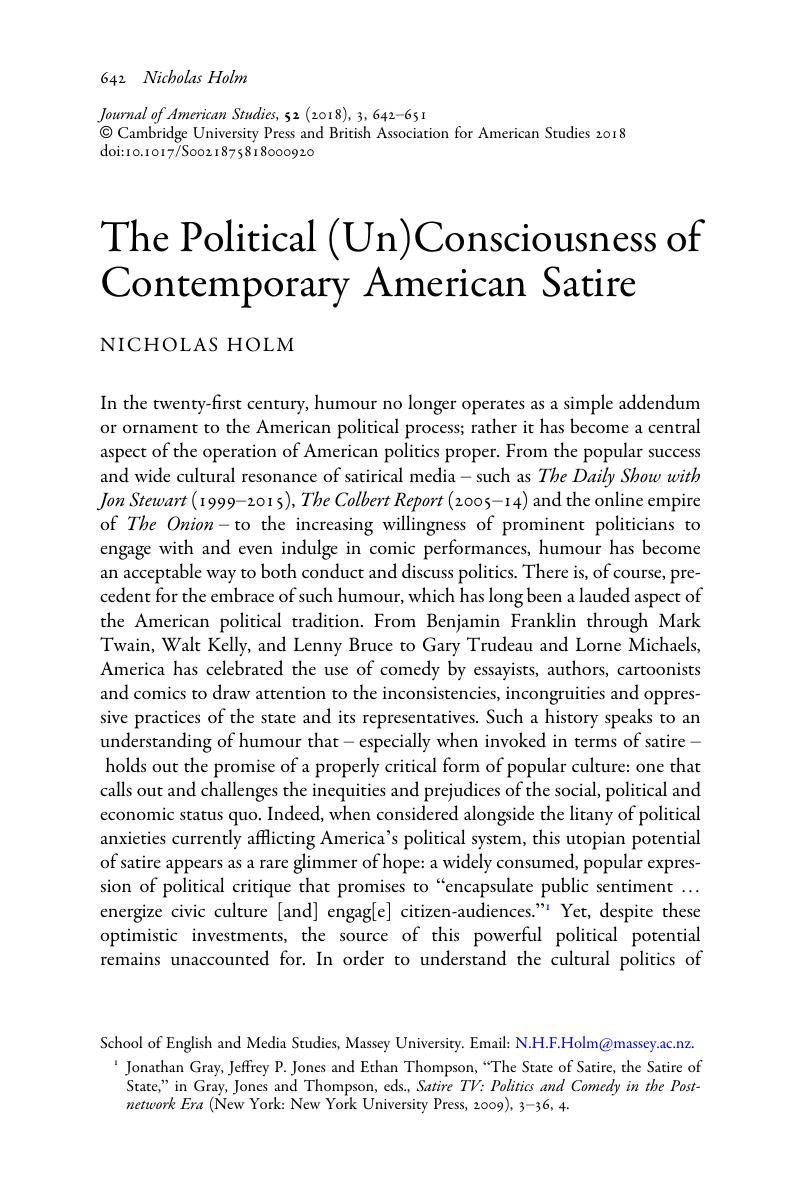Published online by Cambridge University Press: 03 August 2018

1 Gray, Jonathan, Jones, Jeffrey P. and Thompson, Ethan, “The State of Satire, the Satire of State,” in Gray, , Jones, and Thompson, , eds., Satire TV: Politics and Comedy in the Post-network Era (New York: New York University Press, 2009), 3–36Google Scholar, 4.
2 Oliver's quasi-feud with the Key government reached its apex in 2016 with an elaborate musical number in response to an incident where one of Key's government ministers was struck in the face with a dildo during a political protest. Nicholas Jones, “John Oliver's Sex Toy Swipe: What Did Steven Joyce Think?”, NZHerald.co.nz, 16 Feb. 2016, at www.nzherald.co.nz/entertainment/news/article.cfm?c_id=1501119&objectid=11590458.
3 Jameson, Fredric, Postmodernism; Or, The Cultural Logic of Late Capitalism (Durham, NC: Duke University Press, 2005Google Scholar; first published 1981), 48.
4 Gray, Jones and Thompson, 11–13.
5 Phiddian, Robert, “Satire and the Limits of Literary Theory,” Critical Quarterly, 55, 3 (2014), 44–58Google Scholar, 46.
6 Morris, Linda, “American Satire: Beginning through Mark Twain,” in Quintero, Ruben, ed., A Companion to Satire (London: Blackwell Publishing, 2006), 377–99Google Scholar, 377.
7 Ibid., 380, 384, 392–95.
8 Halloran, Fiona Deans, Thomas Nast: The Father of Modern Political Cartoons (Chapel Hill, NC: University of North Carolina Press, 2012), 290–91Google Scholar; Lamb, Chris, Drawn to Extremes: The Use and Abuse of Editorial Cartoons (New York: Columbia University Press, 2004), 43CrossRefGoogle Scholar.
9 Berger, Arthur Asa, Li'l Abner: A Study in American Satire (Jackson, MS: University of Mississippi Press, 1994), 65–68Google Scholar; Green, Diana, “Pogo,” in Booker, M. Keith, ed., Comics through Time: A History of Icons, Idols and Ideas, Volume I (Santa Barbra, CA: Greenwood, 2014), 286–88Google Scholar; Black, James Eric, Walt Kelly and Pogo: The Art of the Political Swamp (Jefferson, NC: McFarland and Company, 2016), 37Google Scholar.
10 Kercher, Stephen E., Revel with a Cause: Liberal Satire in Postwar America (Chicago: The University of Chicago Press, 2006), 1CrossRefGoogle Scholar.
11 Gray, Jones and Thompson, 20; Thompson, Ethan, Parody and Taste in Postwar American Television Culture (New York: Routledge, 201), 11Google Scholar.
12 Kercher, 206, 160–65, 397–424.
13 Grey, Jones and Thompson, 22; Thompson, 5.
14 Henry, Matthew A., The Simpsons, Satire and American Culture (New York: Palgrave MacMillan, 2012), 32–33CrossRefGoogle Scholar.
15 Ibid., 29.
16 Green, Diana, “Doonesbury,” in Booker, M. Keith, ed., Comics through Time: A History of Icons, Idols and Ideas, Volume II (Santa Barbra, CA: Greenwood, 2014), 556–57Google Scholar.
17 Zan, Martha, “Calvin and Hobbes,” in Booker, M. Keith, ed., Comics through Time: A History of Icons, Idols and Ideas, Volume III (Santa Barbra, CA: Greenwood, 2014), 926–29Google Scholar.
18 Thompson, 5–6.
19 Holm, Nicholas, Humour as Politics: The Political Aesthetics of Contemporary Humour (London: Palgrave MacMillan, 2017)CrossRefGoogle Scholar.
20 White, Allon, “‘The Dismal Sacred Word’: Academic Language and the Social Reproduction of Seriousness,” in Carnival, Hysteria and Writings: Collected Essays and Autobiography (Oxford: Oxford University press, 1993), 122–34Google Scholar, 134.
21 Jameson, Fredric, The Political Unconscious: Narrative as a Socially Symbolic Act (Ithaca, NY: Cornell University Press, 1981), 20Google Scholar.
22 Jameson, Fredric, Baumbach, Nico, Young, Damon R. and Yue, Genevieve, “Revisiting Postmodernism: An Interview with Fredric Jameson,” Social Text, 34, 2 (2016), 143–59Google Scholar, 148–9.
23 Jameson, Political Unconscious, 38–39.
24 Ibid., 34.
25 Dean, Jodi, “Politics without Politics,” Parallax, 15, 3, (2009), 20–36CrossRefGoogle Scholar, 24.
26 Williams, Raymond, “The Analysis of Culture,” in The Long Revolution (New York: Columbia University Press, 1961), 41–71Google Scholar, 36–37.
27 Jameson, Political Unconscious, 48.
28 Ibid., 84.
29 Attardo, Salvatore, Humorous Texts: A Semantic and Pragmatic Analysis (Berlin: Mouton de Gruyter, 2001), 25CrossRefGoogle Scholar; Critchley, Simon, On Humour (London: Routledge, 2002), 2–6Google Scholar; Morreall, John, Comic Relief: A Comprehensive Philosophy of Humor (Chichester: Wiley-Blackwell, 2009), 10CrossRefGoogle Scholar; Palmer, Jerry, The Logic of the Absurd: On Film and Television Comedy (London: British Film Institute Books, 1987), 36Google Scholar.
30 Jameson, Political Unconscious, 79.